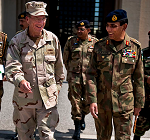It would be encouraging to be able to agree with Mr. Markey that ‘the rise of violent civilian extremists working to bring down the state, democratic or otherwise, is a frightening manifestation of the waning power of the military’ because it would be a sign of Pakistan becoming a country addressing its problems of terrorism and the militarisation of its society.
But we know that extremists first created by the Pakistan military and the ISI in the 1980’s to fight the Soviet Union in Afghanistan and then nurtured to fight India through terrorist activities especially in Jammu and Kashmir, continue to wreak destruction, not least within Pakistan. Not only has no action been taken against the perpetrators of the 26/11 outrage in Mumbai in 2008 but UN and U.S.-designated terrorists like Fazlur Rehman and Hafiz Saeed roam free making hate speeches against India.
Of course there are some terrorist groups that have attacked military installations so the military selectively fights against them. But there is no credible evidence that the Pakistan military has severed links with terrorist groups like the Haqqani network, Gulbuddin Hekmatyar etc. which so frustrated the efforts of the International Security Assistance Forces in Afghanistan that the Chairman of the Joint Chiefs of staff, Admiral Mike Mullen referred to them in 2011 ‘as a veritable arm of the ISI.’
The military-terrorist nexus obstructs improvement of relations with India, delaying the application of Most Favoured Nation status, the minimum requirement to increase bilateral trade and stimulate growth in Pakistan. In a power-scarce country, their hostility has held up the proposal for India to sell Pakistan 500 MW of electricity. They have made water an emotive bilateral issue when the subcontinent is a delicately balanced eco-system that desperately needs cooperation.
The problem in Pakistan is not that politicians and civil society are not jostling with the military to expand their public space. The problem is to change the political culture of habitual deference to the military which is taking advantage of the chaos and confusion that surrounds the election process to indulge in ‘pre-poll rigging.’ Adding to suspicions of military machinations was the bizarre return from exile of former military dictator, Pervez Musharraf.
Neither peace nor prosperity can prevail either within Pakistan or in Afghanistan so long as the military distorts the national objective into a quest for parity with much larger India. Pakistan will need sympathy and support as it confronts the complex choices that the democratisation process continually throws up.
Ambassador Neelam Deo is Director of Gateway House: Indian Council on Global Relations and former Ambassador to Denmark and former Joint Secretary for Myanmar, Sri Lanka, Nepal and Bangladesh.
This debate was exclusively conducted for Gateway House: Indian Council on Global Relations, titled ‘The civil-military equation in Pakistan has begun to tilt in favour of civilians.’ You can read more exclusive content here.
For interview requests with the author, or for permission to republish, please contact outreach@gatewayhouse.in.
© Copyright 2013 Gateway House: Indian Council on Global Relations. All rights reserved. Any unauthorized copying or reproduction is strictly prohibited.


